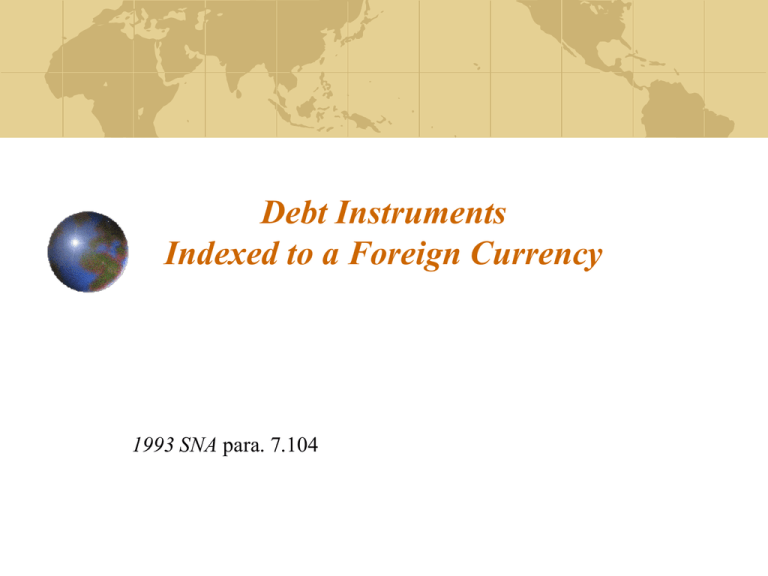Debt Instruments Indexed to a Foreign Currency 1993 SNA
advertisement

Debt Instruments Indexed to a Foreign Currency 1993 SNA para. 7.104 Index linked securities in the SNA 7.104. Index linked securities are financial instruments for which the amounts of the coupon payments (interest) and/or the principal outstanding are linked to a general price index, a specific price index or an exchange rate index. When the coupon payments are index linked, the full amounts of such payments are treated as interest receivable or payable, in the same way as the interest receivable and payable on any other security paying a contractually agreed variable income. When the value of the principal is index linked, the difference between the eventual redemption price and the issue price is treated as interest accruing over the life of the asset in the same way as for a security whose redemption price is fixed in advance. In practice, the change in the value of the principal outstanding between the beginning and end of a particular accounting period due to the movement in the relevant index may be treated as interest accruing in that period, in addition to any interest due for payment in that period. ... 2 Existing Treatment: Concerns? If denominated in foreign currency: changes in the value of principal due to exchange rate changes are revaluations. Indexed to foreign currency: change in the value of principal due to exchange rate changes are interest. What is important The mechanism → indexation Or the economic substance → fixing the cash flows in a foreign currency. Ultimately, what is “denomination?” 3 Example Loan where disbursement and repayments are made in pesos. However, the value of the loan and the interest rate are set with reference to US dollars. 4 Example USD bond USD/Peso exchange rate Stock 1-Jan 1000 Interest Revaluation 100 0 Stock 31-Dec 1100 200 205 210 USD in peso terms 200000 20500 10500 231000 USD-linked bond, current SNA 200000 31000 0 231000 USD-linked, proposal 200000 20500 10500 231000 5 Background Positions are unaffected, but issue is about the allocation between: Interest (income account); and Revaluation / holding gains or losses (other changes in assets account). 6 Background Business accounting practice not helpful in making the distinction between interest and revaluation. 7 Issues Proposal would bring about equality between USD loan and peso loan indexed to USD. Are there sufficient differences between a debt denominated in foreign currency and a debt with both principal and coupons linked to a foreign currency to warrant a difference in treatment? 8 Issues Are negative values of interest payable/receivable acceptable or meaningful, when general interest rates are positive? Or are such fluctuations an indication that the value is driven by revaluation factors rather than being a return for supplying financial resources? 9 Do members agree that debt instruments with both principal and coupons indexed to a foreign currency should be classified and treated in the national accounts as though they are denominated in that foreign currency? Paper was supplied for information at December 2004 AEG meeting. “The paper proposed that if a financial instrument is indexed to a foreign currency, it should be treated as if denominated in that foreign currency. Several participants expressed sympathy with the proposal.” The IMF Committee on Balance of Payments Statistics: (1) concluded that debt instruments with both principal and coupons indexed to a foreign currency should be classified and treated as being denominated in that foreign currency; and (2) recommended that the currency of account and currency of settlement should be clearly distinguished in the new manuals. 10 11




